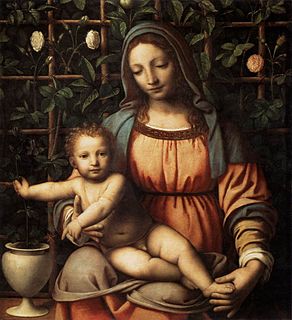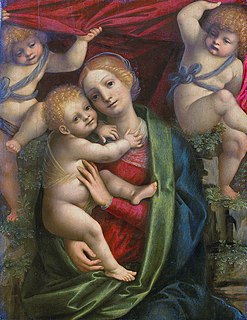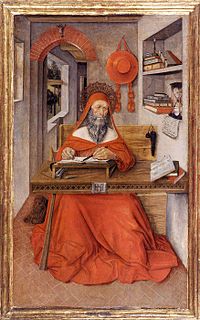
Bernardino Fasolo (Pavia, 1489-1526/1527) was an Italian painter. [1]

Bernardino Fasolo (Pavia, 1489-1526/1527) was an Italian painter. [1]
He was the son of Lorenzo Fasolo, was living in the 16th century at Pavia. He is known to have been a member of the council of the Guild in Genoa in 1520. The following pictures are by him:

Bernardino Luini was a North Italian painter from Leonardo's circle during the High Renaissance. Both Luini and Giovanni Antonio Boltraffio were said to have worked with Leonardo directly; he was described as having taken "as much from Leonardo as his native roots enabled him to comprehend". Consequently, many of his works were attributed to Leonardo. He was known especially for his graceful female figures with elongated eyes, called Luinesque by Vladimir Nabokov.

Ambrogio Borgognone was an Italian painter of the Renaissance period active in and near Milan.

Guglielmo Caccia called il Moncalvo was an Italian painter of sacred subjects in a Mannerist style.

Vincenzo Foppa was an Italian painter from the Renaissance period. While few of his works survive, he was an esteemed and influential painter during his time and is considered the preeminent leader of the Early Lombard School. He spent his career working for the Sforza family, Dukes of Milan, in Pavia, as well as various other patrons throughout Lombardy and Liguria. He lived and worked in his native Brescia during his later years.

Alessandro Tiarini was an Italian Baroque painter of the Bolognese School.

Giovanni Battista Zelotti was an Italian painter of the late Renaissance, active in Venice and her mainland territories.

Bartolomeo Biscaino (1632–1657) was an Italian painter of the Baroque period, active in his native Genoa.

Bernardino Lanini or Lanino was an Italian painter of the Renaissance period, active mainly in Milan.

Andrea Carlone was an Italian painter of the Baroque period, active mainly in his natal city of Genoa.

Pier-Francesco Sacchi was an Italian painter of the Renaissance period.

Giovanni Bernardo Carboni was an Italian painter of the Baroque period.
Alessandro Casolani (1552–1606) was an Italian painter of the late-Renaissance period, active mainly in Siena.

Bernardino de 'Conti was an Italian Renaissance painter, born in 1465 in Castelseprio and died around 1525.
Bernardino de Rossi, who worked at Pavia, was one of the artists called to Milan in 1490 to decorate the Porta Giovia Palace of Lodovico Sforza. In the church of Santa Maria della Pusterla, Pavia, is a picture of the 'Virgin, with Saints and Donors,' signed and dated by him in 1491. Between the years 1498 and 1508 he decorated the Certosa of Pavia with wall paintings, of which the frescoes of the 'Eternal,' the 'Prophets,' and the 'Virgin Annunciate' still remain. In 1511 he executed some frescoes for the church at Vigano, belonging to the Carthusians of Pavia, which have now disappeared. No certain dates can be given of his birth or death.

Antonio da Fabriano was an Italian painter, active in the Region of Marche.
Lorenzo Fasolo (1463–1518), called Lorenzo di Pavia, was a Lombard painter living in the early part of the 16th century, who went from Pavia to Genoa, and was one of the artists employed by Lodovico Sforza in 1490 in the decorations of the Porta Giovia Palace at Milan. His chief work is an altar-piece representing The Deposition from the Cross, which he painted in 1508, for the nuns of Santa Chiara, at Chiavari, where it still remains. The Louvre has by him The Family of the Virgin, dated 1513. His son Bernardino Fasolo was also a painter.

Bernardino Galliari (1707–1794) was an Italian painter, active mainly as a scenic designer and decorator of theaters.

Bernardino Borgognone (1455/60–1525) was an Italian Renaissance painter of the Milanese school.

Bernardino Zaganelli, also Bernardino di Bosio Zaganelli and Bernardino da Cotignola, was an Italian painter, of the Renaissance period.
Fasolo is a surname. Notable people with the surname include:
| Wikimedia Commons has media related to Bernardino Fasolo . |
Attribution: